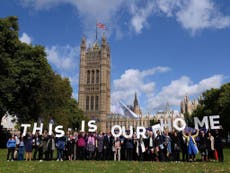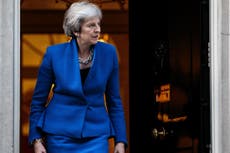Brexiteers loathe the idea of an EU army, but with Trump and Putin destabilising Nato, is it really such a terrible prospect?
Military cooperation in the EU is unlikely to involve the UK after Brexit, leaving the future of Britain’s defence capabilities uncertain

This weekend’s centenary commemorations of the First World War Armistice serve as a reminder that this conflict was supposed to be “the war to end all wars”, its death toll and futility both so monstrous that nations would never contemplate another.
Of course, one hundred years of history has told a very different story. Today the Middle East, with its twin aggressors Iran and Saudi Arabia, is no longer the only unpredictable factor. If the hostile attitude of the presidents of America and Russia towards international peace treaties is added to the mix, global security looks as endangered as ever.
Against this backdrop, French president Emmanuel Macron has called for the creation of a “true European army” to defend the EU from China, Russia and even the US. Macron is not suggesting the US is about to declare war against old European allies but, rather, that he believes the existing alliance through Nato cannot be enough to defend Europe when President Trump plans to quit a major Cold War disarmament treaty. As Macron says: “We need a Europe which defends itself better alone, without just depending on the United States, in a more sovereign manner.” Given the increasingly isolationist track Trump is pursuing, Macron is right to fear for Europe’s defences. So where does this leave Britain, teetering on the brink of exiting the EU?
For Eurosceptics, the concept of an “EU army” was one of the hated totems of Europe, along with the European Court of Justice and the European Court of Human Rights. To them, creating a military alliance with, among others, its Second World War foes Germany and Italy was almost like admitting defeat. The fact that the EU was created as a force for peace in post-war Europe underlines how narrow and wrongheaded that view is.
The simple truth is that, after Brexit, the UK’s military strength will be weakened. The UK will remain a key player in Nato, alongside European allies and the US. Yet Trump has taken every opportunity to rail against Nato and its members – in July he accused Germany, a Nato ally, of being a “captive of Russia”. The US president has also put himself on a different page to Europe – including Britain – in its approach towards Iran. Last year, European Commission president Jean-Claude Juncker, said: “Deference to Nato can no longer be used as a convenient alibi to argue against greater European efforts.” As such, post-Brexit Britain needs allies not only in trade but in defence.
Yet closer military cooperation in the EU is unlikely to involve the UK after Brexit – not that a Conservative government would embrace this if it were on offer anyway. Why would an EU army have an interest in protecting the UK when Brussels has played a hardball game in negotiations on customs, trade and the divorce bill? A reforming EU, of which Macron is a leading player, is trying to discourage other nations from pursuing an exit strategy – so allowing the UK another Brexit opt-in, on military cooperation, is highly unlikely.
As with so many other issues on Brexit, the future of Britain’s defence capabilities was barely mentioned during the 2016 referendum – yet it turns out to be increasingly relevant. This weekend, when Theresa May joins Macron, Trump and Putin in Paris to mark the moment the “war to end all wars” ended, what lies ahead for Britain’s future peace and security?






Join our commenting forum
Join thought-provoking conversations, follow other Independent readers and see their replies